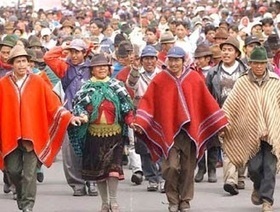Indigeneity is an unusual way to think about International Relations (IR). Most studies of world politics ignore Indigenous perspectives, which are rarely treated as relevant to thinking about the international (Shaw 2008; Beier 2009). Yet Indigenous peoples are engaging in world politics with a dynamism and creativity that defies the silences of our discipline (Morgan 2011). In Latin America, Indigenous politics has gained international legitimacy, influencing policy for over two decades (Cott 2008; Madrid 2012). Now, Indigenous political movements are focused on resisting extractive projects on autonomous territory from the Arctic to the Amazon (Banerjee 2012; Sawyer and Gómez 2012). Resistance has led to large mobilized protests, invoked international law, and enabled alternative mechanisms of authority. In response, governments have been busy criminalizing Indigenous claims to consultation that challenge extractive models of development. Indigenous opposition to extractivism ultimately promotes self-determination rights, questioning the states’ authority over land by placing its sovereignty into historical context. In that sense, Indigeneity is a valuable approach to understanding world politics as much as it is a critical concept to move beyond state-centrism in the study of IR.
Via jean lievens



 Your new post is loading...
Your new post is loading...








This entry was posted on Tuesday, June 10th, 2014 at 11:24 pm and is filed under Activism, P2P Development, P2P Ecology, P2P Energy, P2P Movements. You can follow any responses to this entry through the RSS 2.0 feed. You can leave a response, or trackback from your own site.